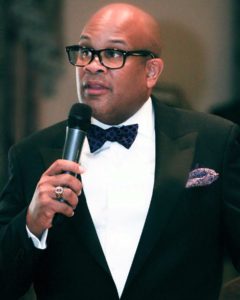
Dr. Aaron Lewis is an educator, publisher and ghostwriter. Lewis is the Libertarian candidate for mayor of Hartford, Conn.
By Dr. Aaron Lewis
Editor’s note: The following appears in the upcoming issue of LP News.
“The Making of a Slave” is a speech, said to have been delivered by Willie Lynch, an authoritarian and strict slave master on the James River in Virginia in 1712. A précis of his speech urges slaveowners to adopt the “secret” to controlling enslaved Africans — to set them against one another. While there has been much debate on the authenticity of this letter and concerning the legitimacy of William Lynch’s existence, few can argue that the contents of his letter has set a cycle in motion for people of color; of guilt, shame, distrust for other people of color, and the insatiable desire to continue to help build, not the American dream, but rather the dream of the oppressor — the Democratic system.
Nearly all of my adult life, I have been a dedicated supporter of the Democratic Party. For the most part, I’ve mainly voted for Democratic candidates in mayoral, gubernatorial, and presidential races. As African-Americans in the United States, most of us have been expected to vote on Democratic lines as we have been programmed to do so for now more than 55 years. We believed that our Democratic elected officials were working for the better interest of all people, including black people, only to discover that it wasn’t the case.
For many black people, the election of President John F. Kennedy symbolized the end of an era where people of color were authorized and sanctioned by the federal government to harsh treatment and offered substandard jobs, wages, and living conditions under southern Jim Crow laws, which clandestinely made its way to the northern states. After the death of President Kennedy, Lyndon B. Johnson, a man dealing with his own racial biases, was given the lofty task of completing the work that Kennedy had begun, first signing in the Civil Rights Act of 1964, after which designing his “Great Society” initiative, whose primary goal was the total elimination of poverty and racial injustice.
While I will admit that things have improved for African-Americans in America since the launch of the civil rights movement up until today, I do not believe that government alone was the leading factor in those changes. I’ve come to realize that all meaningful change happens when “We the People” take our rightful position, walking in the freedom and liberties that we were born with. We must make it happen. Many black people have not taken an analysis, to reflect on whether we’ve really made progress or not, especially under a Democratic form of government.
Since 1945, Hartford, Conn., has had a solidly Democratic leadership, only once briefly interrupted by the first woman mayor of Hartford, Antonina “Ann” Uccello in 1967, a Republican. Today, the condition of our city as with many cities in the U.S., for minorities and people of color, continues to worsen. Hartford has one of the highest failing school districts in the nation. The poverty rate gap between Hartford and its nearby suburban towns is the second worst in the nation and its unemployment rate is nearly double the national average. Despite the clear evidence of how we fare, black people continue to cast their ballots for a party that no longer serves the interest of black people, and quite possibly never has.
In my city, our local, white, democratic politicians have carefully drawn from Willie Lynch’s playbook by intentionally keeping black people against one another. This strategy not only assures a blindly dedicated voting base, but it also ensures that Hartford’s black people will never be free, unless they change. While I fully understand that there is no one party that is perfect, my decision to embrace the Libertarian party was firmly based on the LP’s commitment to maximizing personal and political freedom, less government control, and sustaining a model that every person of color should embrace, one where self-determination, not government controls how you live, learn, and dwell among each other peacefully. Any other offer is merely a smokescreen.

